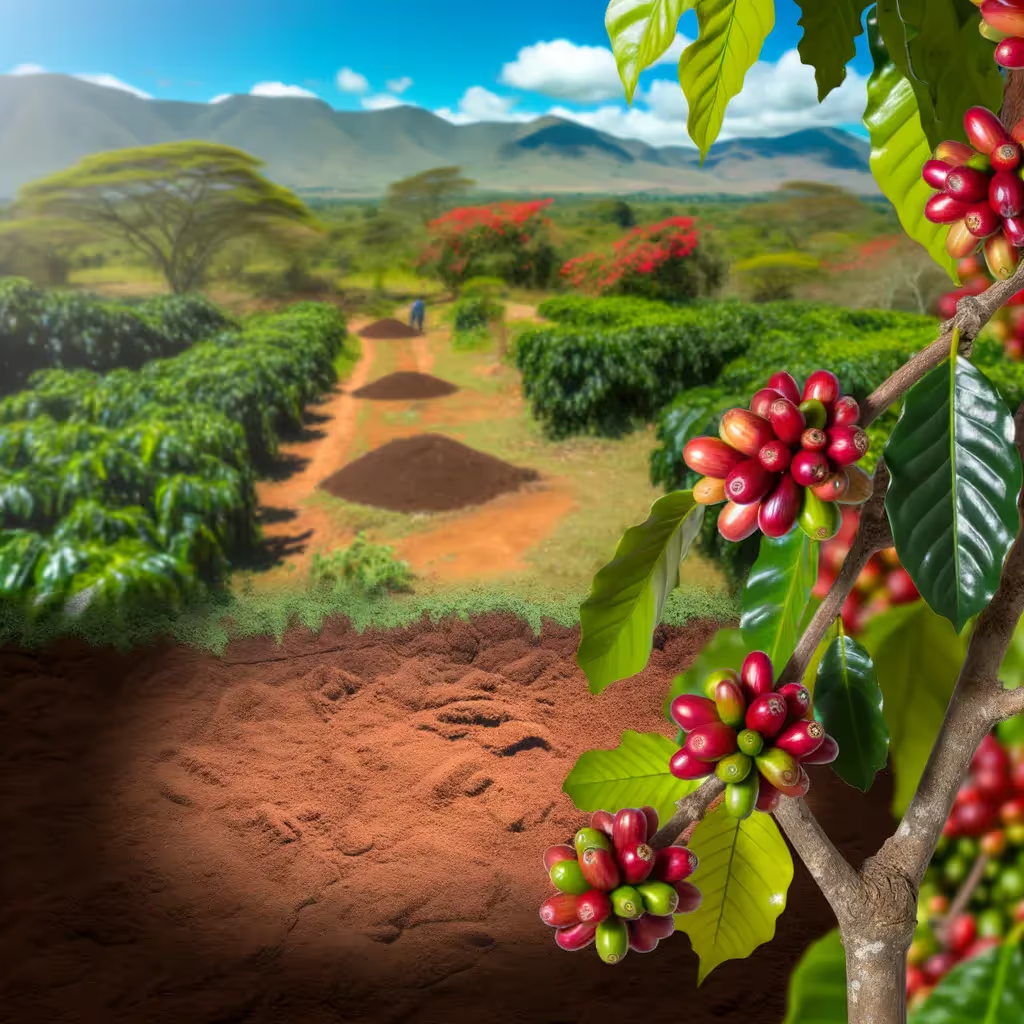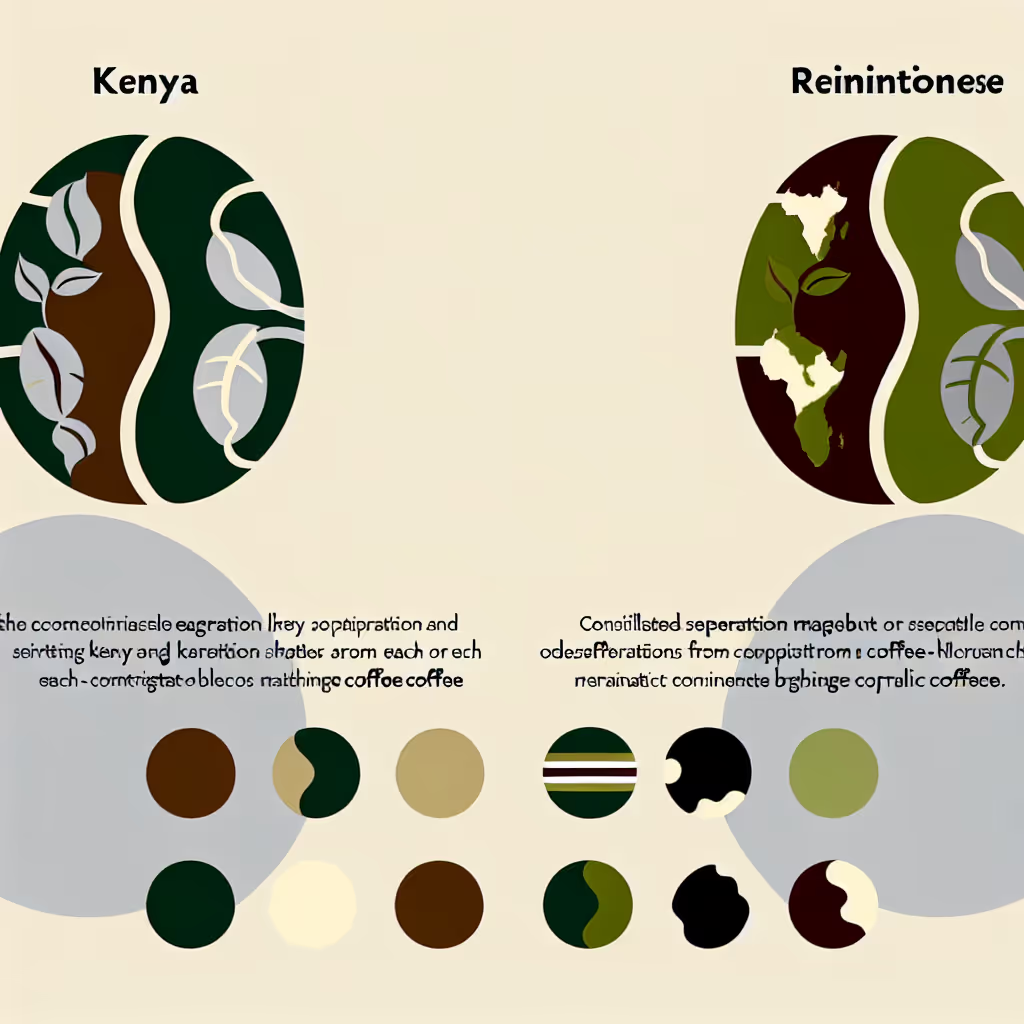Kenyan Vs. Zambian Coffee
This comparison explores the distinct qualities of Kenyan and Zambian coffees, highlighting their flavor profiles, growing conditions, and cultural significance in the world of specialty coffee.

Brief Description
Kenyan coffee is renowned for its bright acidity, full body, and complex flavor profile. Grown in the rich volcanic soils of the Central Highlands, these beans benefit from ideal climate conditions and meticulous processing. The result is a cup that's bold, wine-like, and often described as the 'connoisseur's choice'. With notes ranging from blackcurrant to citrus, Kenyan coffee offers a truly unique and memorable tasting experience.
Zambian coffee is a hidden gem in the African coffee scene, known for its smooth, balanced profile with a gentle acidity and medium body. Grown in the Northern Province, particularly around the Mafinga Hills, these beans thrive in the region's rich volcanic soils and high altitudes. Zambian coffees often exhibit a delightful complexity, featuring notes of citrus, berries, and chocolate, making them a favorite among specialty coffee enthusiasts seeking unique African flavors.
Importance of Comparison
Comparing Kenyan and Zambian coffee origins is crucial for coffee enthusiasts and buyers seeking to explore the diverse flavors of African coffees. Understanding the differences in taste, acidity, and body between these two origins can help consumers make informed decisions when purchasing beans or selecting a brew at their local café. This comparison also sheds light on lesser-known coffee-producing regions, broadening coffee lovers' horizons beyond more familiar origins.
Key Attributes
Origin
Kenyan
Zambian


Consumer Guide
When choosing between Kenyan and Zambian coffee, consider your taste preferences and brewing methods. Kenyan coffee is known for its bright acidity and full body, making it ideal for pour-over and French press brewing. It's perfect for those who enjoy bold, complex flavors with wine-like qualities. Zambian coffee, on the other hand, offers a smoother, more balanced profile with gentle acidity, suitable for espresso and cold brew. If you prefer a milder cup with subtle complexity, Zambian beans might be your best choice. Consider trying both origins in small quantities to experience their unique characteristics firsthand. Pay attention to the roast level, as it can significantly impact the flavor profile of each origin. Lastly, look for beans from reputable roasters who provide detailed information about the coffee's origin and processing methods to ensure the best quality and flavor experience.
Expert Opinions
Coffee expert James Hoffmann notes, 'Kenyan coffee is often considered the pinnacle of African coffee, with its intense flavors and bright acidity. However, Zambian coffee is gaining recognition for its unique balance and complexity.' Specialty coffee buyer Maria Rodriguez adds, 'While Kenyan coffee offers that classic, bold African profile, Zambian beans provide a gentler introduction to African coffees, making them an excellent choice for those transitioning from milder origins.'
FAQs
Kenyan coffee is known for its bright acidity, full body, and complex flavor profile with notes of blackcurrant, citrus, and floral undertones. Zambian coffee, in contrast, offers a smoother, more balanced profile with gentle acidity, medium body, and flavors of citrus, berries, and chocolate.
Kenyan coffee is typically grown at higher altitudes (1400-2100m) in the Central Highlands' volcanic soils. Zambian coffee is cultivated at slightly lower elevations (1200-1800m) in the Northern Province, particularly around the Mafinga Hills. Both regions benefit from rich volcanic soils, but the altitude difference contributes to variations in flavor profiles.
Both Kenyan and Zambian coffees are versatile and can be brewed using various methods. Pour-over and French press are excellent choices for both origins, highlighting their unique characteristics. Kenyan coffee also shines in cold brew, while Zambian coffee performs well as espresso due to its balanced profile.
Kenya has a significantly larger coffee production, with an annual output of around 50,000 metric tons. Zambia, being a smaller producer, has an annual production of approximately 5,000 metric tons. This difference in scale affects availability and sometimes price, with Zambian coffee often being considered a more exclusive option.
Kenyan coffee is typically processed using the washed method, often with double fermentation, and sun-dried. This contributes to its clean, bright flavor profile. Zambian coffee processing is more diverse, including washed, natural, and honey methods, allowing for a wider range of flavor expressions within the origin.
Zambian coffee is often recommended for those new to African coffees due to its smoother, more balanced profile and gentle acidity. It provides a good introduction to the unique flavors of African coffees without the intense brightness that some find overwhelming in Kenyan coffee. However, coffee preferences are subjective, and trying both origins is the best way to determine personal favorites.
Conclusion
Both Kenyan and Zambian coffees offer unique and exciting flavor experiences for coffee enthusiasts. Kenyan coffee stands out with its bright acidity, full body, and complex flavor profile, making it a favorite among those who appreciate bold, distinctive coffees. Zambian coffee, while less well-known, is gaining recognition for its smooth, balanced profile and gentle complexity. For those seeking the classic, intense African coffee experience, Kenyan beans are an excellent choice. However, if you prefer a more subtle introduction to African coffees or enjoy a smoother cup with nuanced flavors, Zambian coffee might be the perfect option. Ultimately, exploring both origins will broaden your coffee horizons and deepen your appreciation for the diverse world of African coffees.






